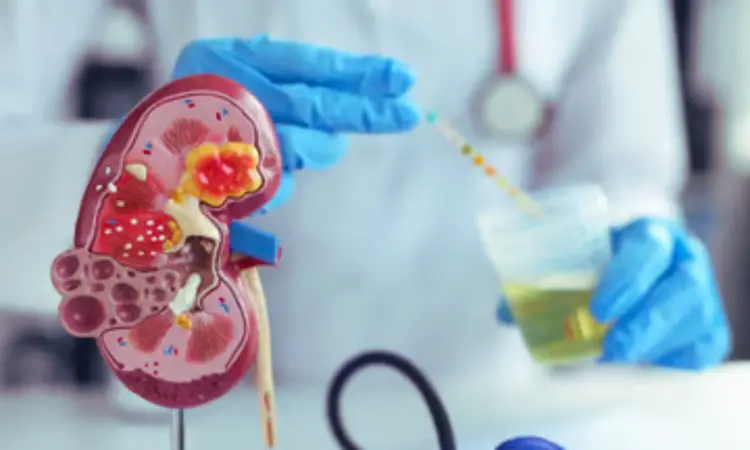- Home
- Medical news & Guidelines
- Anesthesiology
- Cardiology and CTVS
- Critical Care
- Dentistry
- Dermatology
- Diabetes and Endocrinology
- ENT
- Gastroenterology
- Medicine
- Nephrology
- Neurology
- Obstretics-Gynaecology
- Oncology
- Ophthalmology
- Orthopaedics
- Pediatrics-Neonatology
- Psychiatry
- Pulmonology
- Radiology
- Surgery
- Urology
- Laboratory Medicine
- Diet
- Nursing
- Paramedical
- Physiotherapy
- Health news
- Fact Check
- Bone Health Fact Check
- Brain Health Fact Check
- Cancer Related Fact Check
- Child Care Fact Check
- Dental and oral health fact check
- Diabetes and metabolic health fact check
- Diet and Nutrition Fact Check
- Eye and ENT Care Fact Check
- Fitness fact check
- Gut health fact check
- Heart health fact check
- Kidney health fact check
- Medical education fact check
- Men's health fact check
- Respiratory fact check
- Skin and hair care fact check
- Vaccine and Immunization fact check
- Women's health fact check
- AYUSH
- State News
- Andaman and Nicobar Islands
- Andhra Pradesh
- Arunachal Pradesh
- Assam
- Bihar
- Chandigarh
- Chattisgarh
- Dadra and Nagar Haveli
- Daman and Diu
- Delhi
- Goa
- Gujarat
- Haryana
- Himachal Pradesh
- Jammu & Kashmir
- Jharkhand
- Karnataka
- Kerala
- Ladakh
- Lakshadweep
- Madhya Pradesh
- Maharashtra
- Manipur
- Meghalaya
- Mizoram
- Nagaland
- Odisha
- Puducherry
- Punjab
- Rajasthan
- Sikkim
- Tamil Nadu
- Telangana
- Tripura
- Uttar Pradesh
- Uttrakhand
- West Bengal
- Medical Education
- Industry
Glucosamine helps reduce risk of kidney stone development in non-sedentary individuals

Kidney stones can be excruciatingly painful, and understanding the factors that contribute to their development is crucial. A recent study conducted in the UK aimed to explore the connection between sedentary behaviours, glucosamine use, and the risk of kidney stones. This comprehensive study highlights the negative impact of sedentary behaviours, including TV-watching, driving, and non-occupational computer use, on the risk of developing kidney stones.
The study was published in Preventive Medicine by Xiaoqin Gan and colleagues. The study analysed data from 473,225 participants in the UK Biobank who had no history of kidney stones at the beginning of the research. Sedentary behaviour was defined as the combined time spent watching TV, driving, and using a computer for non-occupational purposes. The primary outcome investigated was the occurrence of new-onset kidney stones.
Over a median follow-up period of 12.0 years, the study recorded 5,528 cases of kidney stones. The results were striking: all major sedentary behaviours, including TV-watching, driving, and non-occupational computer use, were significantly associated with an increased risk of kidney stones (all p for trend < 0.05). Notably, individuals with a total sedentary time of 3.5 hours or more per day had a significantly higher risk of developing kidney stones compared to those with less sedentary time (HR, 1.18; 95% CI, 1.10–1.27).
However, what sets this study apart is its exploration of glucosamine use. It revealed that regular glucosamine users had a significantly lower risk of new-onset kidney stones, but this effect was limited to individuals with less than 3.5 hours of total sedentary time per day (HR, 0.72; 95% CI, 0.59–0.86). On the other hand, those with 3.5 hours or more of sedentary time did not experience a significant reduction in kidney stone risk (HR, 0.99; 95% CI, 0.91–1.08; p-interaction = 0.001). Importantly, there was a dose-response relationship between glucosamine use and kidney stones risk among participants with less sedentary time (p for trend < 0.001).
Interestingly, the study also looked into whether genetic factors influenced this association. However, it found that genetic risks of kidney stones did not significantly modify the relationship between sedentary behaviour, glucosamine use, and kidney stone risk. Moreover, it suggests that regular glucosamine use may lower the risk of kidney stones, particularly in individuals with less sedentary time. These findings emphasize the importance of maintaining an active lifestyle and considering dietary supplements like glucosamine for those at risk of kidney stones. Further research in this area could lead to a better understanding of preventive measures for kidney stone formation.
Reference:
Gan, X., Zhou, C., He, P., Ye, Z., Liu, M., Yang, S., Zhang, Y., Zhang, Y., Huang, Y., Xiang, H., & Qin, X. Inverse association of glucosamine use and risk of new-onset kidney stones in UK adults with less sedentary time. Preventive Medicine,2023;177(107738):107738. https://doi.org/10.1016/j.ypmed.2023.107738
Dr Kartikeya Kohli is an Internal Medicine Consultant at Sitaram Bhartia Hospital in Delhi with super speciality training in Nephrology. He has worked with various eminent hospitals like Indraprastha Apollo Hospital, Sir Gangaram Hospital. He holds an MBBS from Kasturba Medical College Manipal, DNB Internal Medicine, Post Graduate Diploma in Clinical Research and Business Development, Fellow DNB Nephrology, MRCP and ECFMG Certification. He has been closely associated with India Medical Association South Delhi Branch and Delhi Medical Association and has been organising continuing medical education programs on their behalf from time to time. Further he has been contributing medical articles for their newsletters as well. He is also associated with electronic media and TV for conduction and presentation of health programs. He has been associated with Medical Dialogues for last 3 years and contributing articles on regular basis.
Dr Kamal Kant Kohli-MBBS, DTCD- a chest specialist with more than 30 years of practice and a flair for writing clinical articles, Dr Kamal Kant Kohli joined Medical Dialogues as a Chief Editor of Medical News. Besides writing articles, as an editor, he proofreads and verifies all the medical content published on Medical Dialogues including those coming from journals, studies,medical conferences,guidelines etc. Email: drkohli@medicaldialogues.in. Contact no. 011-43720751


